
Becoming a professional blogger using AI-driven tools can greatly enhance your efficiency and content quality. Here’s a detailed guide to help you get started:
- Choose Your Niche:
Select a specific niche that you’re passionate about and have expertise in. This will help you establish yourself as an authority in that field. - Content Planning:
Use AI tools like content idea generators to brainstorm topics and trends within your niche. Tools like these can provide you with a list of potential blog post ideas. - Keyword Research:
Employ AI-powered keyword research tools to identify relevant and high-ranking keywords. These tools can suggest keywords that have good search volume and low competition. - Content Creation:
AI-driven content generators can help you draft articles quickly. While these tools can provide a good starting point, be prepared to edit and refine the content to match your unique style and voice. - Grammar and Style Check:
Utilize AI-powered grammar and style checkers to ensure your content is error-free and reads well. These tools can catch spelling, punctuation, and grammar mistakes. - Content Enhancement:
AI tools like text enhancers can help you improve the readability and engagement of your content. They can suggest more powerful vocabulary, sentence structure changes, and overall improvements. - Image Selection and Generation:
Use AI tools to find relevant and high-quality images for your blog posts. Some tools can even generate custom images based on your content. - Content Optimization:
AI-driven SEO tools can help you optimize your content for search engines. They can provide suggestions for meta titles, descriptions, and keyword placement. - Social Media Management:
AI tools can assist in scheduling and automating your social media posts. They can help you maintain a consistent online presence and reach a wider audience. - Audience Analysis:
AI analytics tools can provide insights into your audience’s behavior, preferences, and engagement patterns. This data can help you tailor your content to better serve your readers. - Content Personalization:
Utilize AI-driven personalization tools to recommend related articles to your readers, enhancing their overall experience on your blog. - Monetization Strategies:
Research and implement various monetization strategies such as affiliate marketing, sponsored posts, and selling digital products. AI tools can help you identify suitable affiliate products and track performance. - Continuous Learning:
Stay updated with the latest AI trends and tools in content creation and optimization. The field is rapidly evolving, and staying informed will give you a competitive edge. - Ethical Use of AI:
While AI tools can be incredibly helpful, make sure you’re adding your own expertise and human touch to the content. Avoid using AI in a way that produces misleading or unoriginal content. - Engage with Your Audience:
Respond to comments, emails, and social media interactions personally. AI can assist in managing large volumes of interactions, but genuine engagement helps build a loyal readership. - Consistency is Key:
Regularly update your blog with fresh content. AI can assist in content creation, but maintaining consistency in posting is essential for retaining your audience.
While AI tools can streamline many aspects of your blogging journey, it’s your unique perspective, creativity, and expertise that will set you apart as a professional blogger.
Pro Blogger: dealing with success and failure

Success as a blogger can be measured in various ways, depending on your goals and niche. Here are some key indicators to help you gauge your success:
- Website Traffic:
Monitor your website’s traffic using tools like Google Analytics. Increasing and sustaining a growing number of visitors over time is a positive sign of success. - Engagement Metrics:
Look at metrics like comments, social media shares, likes, and follows. High engagement indicates that your content resonates with your audience. - Subscriber Growth:
The number of subscribers to your blog’s email newsletter can be a strong indicator of success. It shows that readers value your content enough to sign up for updates. - Social Media Following:
Growing followers on social media platforms indicates an expanding reach and influence. Focus on platforms where your target audience is most active. - Conversion Rates:
If your goal is to monetize your blog, track conversion rates for various monetization strategies, such as affiliate sales, product purchases, or ad clicks. - Backlinks and Mentions:
The number and quality of backlinks from other reputable websites can be an indicator of your authority and influence within your niche. - Ranking on Search Engines:
Monitor your blog’s search engine rankings for key terms in your niche. Higher rankings can lead to increased organic traffic. - Time on Page:
Analyze how long visitors spend on your blog posts. Longer average time on page suggests that readers are engaged and finding value in your content. - Return Visitors:
A high percentage of return visitors shows that your content is compelling enough for people to come back for more. - Media Mentions and Collaborations:
If you start getting mentioned in other media outlets or collaborating with influential people in your industry, it’s a sign that you’re gaining recognition. - Revenue and Earnings:
If your blog is generating income, increasing revenue over time or reaching specific income goals is a clear indicator of success. - Brand Partnerships:
Brands reaching out for collaborations or sponsored posts suggests that you’re perceived as an influential figure in your niche. - Impact on Readers:
Positive feedback from readers who have benefited from your content is a meaningful indicator of success. Focus on the value you provide to your audience. - Consistency and Growth:
Consistently producing high-quality content and seeing growth in various metrics over time is a positive sign that you’re on the right track. - Personal Satisfaction:
If you’re proud of the content you’re creating and you’re enjoying the process, that’s a valuable indicator of success on a personal level.
Your success as a blogger is a journey, and different bloggers have different goals. Define your own metrics for success based on your objectives, and periodically evaluate your progress to make informed decisions about your blog’s direction.

If you’re not experiencing the level of success you had hoped for as a blogger, don’t get discouraged. Instead, use this as an opportunity to assess and improve your approach.
Here are some steps you can take to enhance your blogging strategy and increase your chances of success:
- Analyze Your Content:
Take a critical look at your blog posts. Are they relevant, valuable, and well-structured? Make sure your content addresses your audience’s needs and interests. - Refine Your Niche:
If you’re not attracting a focused audience, consider narrowing down your niche. Focusing on a specific area of expertise can help you stand out and become an authority in that field. - Improve Content Quality:
Invest time in improving the quality of your writing, visuals, and multimedia elements. High-quality content tends to attract more readers and engagement. - SEO Optimization:
Review your SEO strategy. Are you using relevant keywords in your content and meta tags? Improving your search engine optimization can lead to better visibility. - Promotion and Distribution:
If you’re not promoting your content effectively, it might not be reaching your target audience. Share your posts on social media, participate in relevant online communities, and consider email marketing. - Engagement with Audience:
If you’re not engaging with your audience, you might be missing out on building a loyal readership. Respond to comments, emails, and messages promptly. Consider asking for feedback and involving readers in discussions. - Diversify Content Formats:
Experiment with different types of content, such as videos, podcasts, infographics, or webinars. Diversifying content formats can attract a wider range of audience preferences. - Consistency and Frequency:
Consistency is key. If you’re not posting regularly, your audience might lose interest. Create a content schedule that you can realistically maintain. - Collaborate and Network:
Build relationships with other bloggers, influencers, and experts in your niche. Collaborating on content or cross-promotions can help you tap into new audiences. - User-Friendly Website Design:
Ensure your website is user-friendly, easy to navigate, and mobile-responsive. A clutter-free and visually appealing design can enhance user experience. - Analytics and Learning:
Use analytics tools to track your performance. Analyze what’s working and what’s not. Adjust your strategies based on the insights you gather. - Personal Branding:
Work on establishing a strong personal brand. Showcase your unique perspective and personality, which can help you connect with your audience on a deeper level. - Continuous Learning:
Stay updated with industry trends, blogging techniques, and new tools. The blogging landscape is constantly evolving, and adapting to these changes is crucial. - Patience and Persistence:
Success in blogging takes time. Don’t give up if you don’t see immediate results. Keep refining your strategies and learning from your experiences. - Seek Feedback:
Don’t be afraid to ask for feedback from your audience, fellow bloggers, or mentors. Constructive criticism can provide valuable insights for improvement.
Every blogger faces challenges on their journey, and setbacks are opportunities to learn and grow. Take a proactive and strategic approach to improving your blog, and over time, you’ll likely see positive changes in your results.





